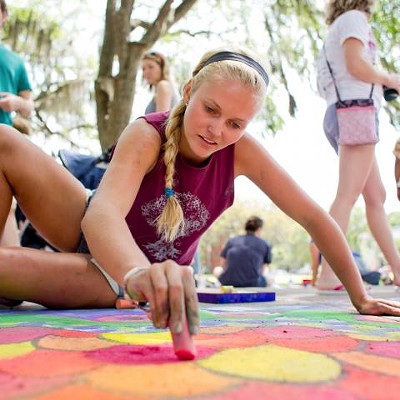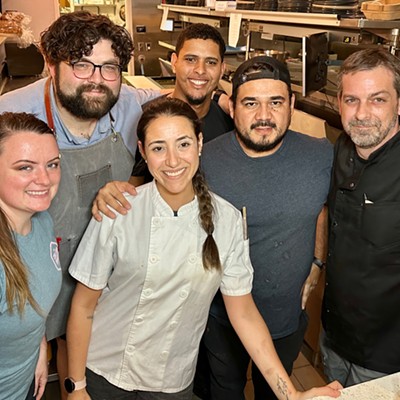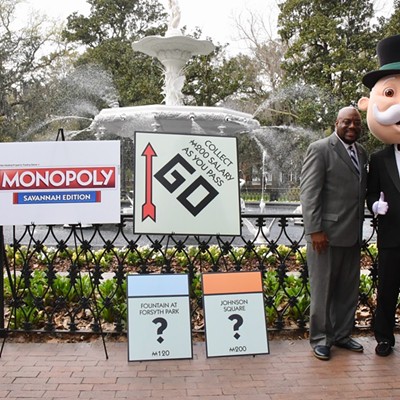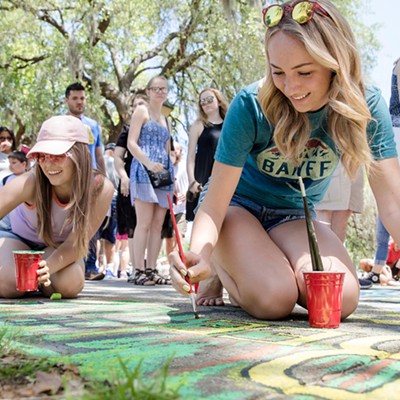How long have you been involved with the CJA in any significant capacity?
Skip Jennings: Since 1987. Right now I am the 1st Vice President for Coastal Jazz. I’ve been on and off of their board for years, but the way most folks know me in the CJA is as the primary onstage MC for the festival since 1987.
You came into that role through your work on local radio, correct?
Skip Jennings: Yes. I was doing some jazz shows at the time on WSVH, 91.1 FM. A person who was in charge of the festival back then asked me to come be one of the MCs, and the main acts that year included McCoy Tyner, Maynard Ferguson and Buddy DeFranco. After being up on stage with all those guys, I said, man, this is something I want to do every year! (laughs) McCoy Tyner was one of my heroes, and let me just say that being the MC of the fest year after year has been a real privilege. I’ve been able to meet so many of these jazz greats in that time. Folks like Art Blakey, Carmen McRae and Joe Williams, who are no longer around, plus so many that are still with us. It’s been a really special honor.
Who chooses the artists for each year’s festival?
Skip Jennings: Well, I can only tell you the way we’ve been doing it for the last three years, because that’s when I stepped back into the organization in a big way. We have a committee with five people on it, and actually, we’re already working on the 2009 festival. It’s an unending cycle. Some artists are pitched to us by their booking agents and others we seek out on our own. There are three tiers to the acts we present. We always try to find strong, nationally-known headliners and then standout regional and local artists for further down on the bills. We look at different nights of the festival differently. I mean, you remember a couple of years ago when we were getting a lot of criticism in the local media. I always loved that line you wrote about “Has the Jazz Fest lost its mojo?” We’ve been trying since then to change some aspects of the festival from the way it had been done year after year. Not to be overly critical, but we did get into a very comfortable rut after a while. They were all great festivals with fantastic music and I was glad to be there for every one of them. But they were becoming predictable in some respects. So, we’ve tried to change things up some. We started last year with taking the Friday night and using it to feature contemporary and smooth jazz. And of course, last year’s Friday night featured The Yellowjackets, and it was by far the biggest Friday night crowd we’ve ever seen.
The other thing we changed last year —and this is a process that is continuing— is that for many years, the first four nights of the festival, Monday through Thursday, were all held in clubs. Whether it was down at the Cobblestone Conch House or last year at Kokopelli’s, or before that at Suzabelle’s. Now we’re trying to get away from that, and, at the same time, expand the festival geographically. It’s always been downtown, but last year we challenged that notion by putting on a big concert out at Armstrong on the Wednesday night. That was a success, but this year the AASU Fine Arts Auditorium is being renovated, so it’s unavailable. The folks at Savannah Country Day are being nice enough to allow us to use their school facility for the show.
What was the response to that first-ever Southside event?
Skip Jennings: It was really pretty good. It was a different crowd than we normally see. They were probably a little older, but that’s OK. I got the feeling it was a lot of folks who likely wouldn’t come downtown at night. We’ll continue to do things like that so it won’t always be downtown. I think it was Alderman Tony Thomas who brought that up at one of our grant meetings a few years ago. He said, “why does it always have to be downtown?” We went away from that meeting asking ourselves the same question. And so, this year we’ll be out on the Southside for that. Another thing we’re doing differently is partnering with the Psychotronic Film Society for a screening of a jazz documentary at the Jewish Education Alliance on Abercorn near Derenne. The idea is to liven up the festival, spread it out around town, and do things to engage folks who might not come to some of the bigger shows in the park for whatever reason.
Personally, I’ve always felt that the club events were a bit restrictive because they were by nature held late in the evenings and they were downtown. We had good crowds for those events, and the clubs were full, but why should we limit it like that? I’d like to get to the point where each night of the whole week there is either a concert or some other type of jazz-related event. Hopefully next year we’ll do a film event on the Monday night, and perhaps something at the Savannah Arts Academy’s auditorium featuring nothing but local high school and college age musicians.
Did the city’s current alcohol ordinance preventing folks under 21 from being in bars even if there is bona fide live entertainment taking place play any role in cutting back on nightclub events?
Skip Jennings: Not really. However, there’s only a certain number of people who will go to a downtown club on Monday through Wednesday nights anyway. Also, those events tended to run late. So now, instead of having something that starts at 9 pm and ends at 1 am, we have something that starts at 7 pm and is over by 9 pm. That way, folks can enjoy the show and still get up and go to work the next morning and not feel like they’ve been burning the candle at both ends. We want to make the music and the festival accessible to as many people as possible. But you’re right, if you have it in a club or a bar, then underage people can’t get in. The one time that came up was at one of our traditional after-show jam sessions where a lot of the famous musicians will head down to a club to play with each other. There were a few of the local high school students who really wanted to participate and have a chance to sit in with some of these big name talents, but the folks at Kokopelli’s weren’t comfortable with that and they couldn’t be allowed in. It was understandable though, because, hey, it was a bar.
This is the 27th year this festival has been in existence. What’s the single most different aspect of this 2008 event than in years past?
Skip Jennings: It’s not our intent to radically change the festival in any one year. Rather, it’s our feeling that the festival is something that should be constantly evolving.
Well, that makes sense. The idea that a festival which celebrates something as alive and ever-changing as jazz would become stagnant is kind of silly.
Skip Jennings: Agreed! (laughs)
How would you describe the excitement level over at the CJA for this year’s festival?
Skip Jennings: I think we’re all excited about the direction of the festival. It’s continuing to evolve and we have some new additions to the Board that have brought in a lot of fresh energy. That can’t help but be a good thing.
How important is the blues component of the jazz fest?
Skip Jennings: A couple of years ago, when we were trying to decide what we could do to improve the event, we talked about whether or not we should even continue to have blues music be a part of the Jazz Fest. Ultimately, we decided that yes, we should, but that it needed to be made more of a priority and somehow upgraded. For years, we’d had solid, good blues acts, but they weren’t what you’d call famous artists. So, last year we had John Lee Hooker, Jr., and this year we’re bringing in James Cotton. We always have Eric Culberson open up for the main attractions and we’ll continue to invite him to do that as long as he’d like to, because we think so much of his talent and his band. Last year we had Elliot & The Untouchables and this year we’ll have Wanda Johnson & Shrimp City Slim. She’s really terrific, and opened for Johnny Winter at last year’s Roundhouse Blues & BBQ Fest. Then, James Cotton, who is just fantastic, high-energy Chicago blues. He played a couple of years back at the Roundhouse event with Howlin’ Wolf’s guitarist Hubert Sumlin.
Well, James is one of the very last of the Golden Age blues stars who’s still alive and touring.
Skip Jennings: Yeah. I mean, how many people from Muddy Waters’ legendary 1950s band are left?
Bob James is one of the best-known so-called “smooth jazz” artists in the world, and he’ll headline this year’s free Friday night show in Forsyth Park. Do you still run into some folks in the local jazz scene who decry the inclusion of smooth jazz in this festival, or do most folks involved realize it’s in everyone’s best interests to provide as wide a variety of jazz styles as possible?
Skip Jennings: You know, I’ve into heard any criticism whatsoever of it this year. There may have been some trepidation last year when we added it for the first time, but so many people showed up that night that there could be no doubt it was something we should continue doing.
How long has this Bob James show been in the works?
Skip Jennings: A couple of years, actually. I met with him for lunch a few years ago to discuss him possibly becoming involved with the festival, since he now has some ties to Savannah. We’d like to see him become involved on an ongoing basis. I don’t know if that would take the same form as, say, Ben Riley’s involvement. But to have a significant, famous jazz artist of his caliber who could reliably appear in a variety of formats? We’d love that. We wanted to have him play last year, but he was on tour in Japan at the time and it just didn’t work out.
What can you tell me about the lineup Bob James’ will have for this year’s festival?
Skip Jennings: I know it will be a quintet of piano, guitar, bass, drums and a sax and flute player.
What’s the single biggest misconception people have about the Savannah Jazz Fest?
Skip Jennings: Well, to a degree —and I’ve not heard this much in the last year or two, but we were getting this a lot a few years back— was that the festival just brought the same acts year after year. Now, of course that’s not true, but I understand why some folks might have thought that. There are some constants. The Savannah Jazz Orchestra is gonna play every year, but when they play, they’re playing different songs with a different artist each time around! In other words, they’re serving as the local backing band for a major vocalist or soloist. Over the years, they’ve backed up singers like Jon Hendricks, Marlene Shaw, Dianne Schuur, Kevin Mahogany and more. They’ve backed up instrumentalists like Clark Terry, Jimmy Heath, Benny Golson and loads of other great folks. So some people think, oh, it’s the Savannah Jazz Orchestra again — but it’s like a completely different show each year. This year, they’ll be backing Simone, who is Nina Simone’s daughter. Have you heard her yet?
Yes. She’s really something. There are a lot of people out there who get into the music biz and trade on the name or reputation of their musician parents, and who are mediocre or average. Then there are some who are legitimately talented and deserving of recognition, regardless of whether their last name helps open some doors with the public. She seems to be a very promising artist with the potential for a long career.
Skip Jennings: I agree. She’s just released a big-band album of songs her mother was known for, and it’s terrific. We’re very much looking forward to her show. Then you have drummer Ben Riley. He’s played at most of the last several festivals, but he brings somebody different with him each year — and they are major, famous players like Randy Weston, Cedar Walton, Kenny Barron, and Mulgrew Miller. Or the Monk Legacy Septet or the group Sphere. So yes, Ben Riley is a part of every festival, but again, it’s different each time.
I’m assuming that many of these artists who accompany him would otherwise be out of your reach, and that his invitation and imprimatur is what’s greasing the wheel, so to speak, in terms of bringing them to Savannah.
Skip Jennings: Without a doubt. For a lot of these guys, they really want to come just to do the gig with Ben. It’s a change for them, something different. And you know, in termjs of historical significance, Ben is one of the all-time great jazz drummers who is still around. He’s right at the top of the list. He played with Duke Ellington, and of course with Theloniuous Monk, but really, over the years he’s played with most everyone.
Where do you see the Savannah Jazz Fest in five years? Do you imagine it will look and function much the same as today, or could it be an entirely different animal all together?
Skip Jennings: Well, first of all, I still expect there will be a Savannah Jazz Fest five years from now, and our plan is to grow it to where it is a much bigger event than it is now. I expect the focus will remain on the three big days in Forsyth Park. But it’s the other stuff we can do that can change it and help it to grow in scope. We need to upgrade the Children’s Day on Sunday, and we’re having discussions now on how to best do that. We really want to try and bring many more people into jazz through the first four days around town at an increasing number of locations.
Any other thoughts on what the future holds for the Savannah Jazz Fest?
Skip Jennings: I would say that the main thing we need more than anything else is more participation in the community. If people love jazz, they should seriously consider getting more involved with the Coastal Jazz Association.
Listen & Learn: coastal-jazz.org




























